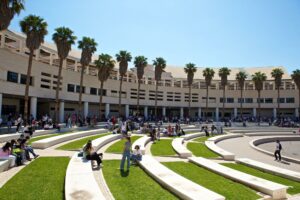This article provides a comprehensive analysis of the updates included in this “new student stay permit” aimed at those who wish to study in Spain or are already pursuing studies in the country.
With the entry into force of Royal Decree 1155/2024 on May 20, 2025 (The New Immigration Regulation), Spain introduces a profound reform in its immigration rules. One of the most affected areas is the stay for studies, which now features new rules, deadlines, conditions, and rights for foreign students.
1. Who can apply for the New Student Stay Permit and where?
Applications can be made:
- At Consular Offices in the country of origin.
- From within Spanish territory, only if:
- The person is legally in Spain (with residence or short-stay visa).
- The program falls under one of the following categories:
- Higher education studies (art. 52.1.a)
- Specialized Healthcare Training (MIR, FIR, etc., art. 58)
- Training activities with technical certification or professional qualification (CAP)
Important update: Any subtype can be applied for from Spain if the foreigner holds a valid residence permit.
2. Crucial change in application deadlines
One of the most significant reforms is the requirement of a double advance notice to request the authorization:
- The application must be submitted at least:
- 2 months before the start of the course or activity.
- 2 months before the expiration of the applicant’s legal status (residence or visa).
If the deadline is met, the submission extends the previous stay or residence until the application is resolved.
Also, only adults (18 years or older) can apply for these subtypes.
3. Duration and extensions of the stay
By default, the authorization will be for one year, except for:
- Higher education and Specialized Healthcare Training, which may be granted for their entire duration.
Allowed extensions:
- One extension: volunteering and training activities.
- Two extensions: higher education and vocational training.
- Student mobility: no extension allowed; a new authorization must be processed.
The Immigration Office that issued the initial authorization is the only competent authority to process extensions.
Extensions must be processed electronically through MERCURIO.
4. Requirements for maintaining and extending the permit
To maintain the authorization, the applicant must:
- Prove current enrollment and payment of fees for the authorized course.
- Maintain the initial requirements (enrollment, financial means, insurance, etc.).
- Academic performance proof is not mandatory, except in:
- Language studies: passing the course (EOI or DELE) is required.
- Preparation for Specialized Healthcare Training: proof of exam registration.
- Extensions are not permitted for new studies not originally authorized.
5. Financial means: flexibility and exceptions
General rule:
- Prove means equivalent to 100% of the IPREM per month.
- +75% for the first family member, +50% for each additional one.
It is not necessary to prove financial means if:
- A firm job contract or job offer is presented.
- Accommodation is prepaid.
- It concerns student mobility or volunteering covered by the hosting entity.
6. Health insurance
Applicants must purchase private health insurance valid in Spain, with coverage equivalent to public healthcare, valid throughout the stay.
If the student contributes to Social Security, this requirement is considered fulfilled (also applies to family members).
7. Termination of authorization: new causes
Article 200 RLOEX lists specific causes:
- Entry ban.
- Fraud or forgery.
- Change of purpose (use different from authorized).
- Loss of requirements, passport, or nationality.
- Threat to public security.
- Conviction for serious crimes (human trafficking, illegal immigration).
- Administrative expulsion.
- Negative administrative silence: if no resolution within deadline, it is considered denied.
8. Right to work: compatibilities and subtypes
The new regulation introduces three study groups related to work rights:
A. Authorized to work directly:
- Higher education (art. 52.1.a)
- Specialized Healthcare Training
- Vocational training (including professional certificates)
B. No authorization needed for internships:
- Curricular or external non-labor internships.
C. Require prior authorization:
- Languages, volunteering, preparation for specialized healthcare training, mobility, among others.
Maximum authorization: 30 hours per week, except intensive vocational training.
Authorization can be requested by the employer or the student.
Geographic scope: entire autonomous community and neighboring communities if compatible with studies.
The EX12 form is eliminated. Work authorization requests are integrated into the EX00 form.

9. Change to residence and work
It is possible to change directly (without a visa) if the student has completed:
- Higher education studies (52.1.a)
- Medium or higher vocational training (52.1.b)
- Training with professional qualification (CAP) (52.1.e)
- Professional certificates (levels 2 and 3)
- Specialized Healthcare Training (art. 58)
Cannot change:
- Mobility programs, volunteering, language courses, conversation assistants, or specialized healthcare preparation.
If the student was funded by development cooperation programs, they cannot directly change to residence and work.
10. Student family members
Only eligible if the principal is enrolled in:
- Higher education (52.1.a)
- Specialized Healthcare Training (art. 58)
Authorized family members:
- Spouse or registered partner.
- Unmarried minor children, or adult children with disabilities.
- Family members assisting disabled holders.
Can apply within Spain if the foreigner is not irregular and at least 90 days remain on the current authorization.
Children born in Spain can also be authorized as family members if applied within 6 months of birth.
11. Mandatory electronic submission
Must be submitted electronically via MERCURIO:
- Extensions of student stays
- Renewals of temporary residence
- Initial residence and work applications
Only some exceptions (arraigos, residence by exceptional circumstances) can be submitted in non-electronic format.
12. Legal representation and assistance
Applications can be submitted by:
- The applicant themselves.
- A legal representative with notarized power of attorney or apud acta.
- A licensed professional (lawyer, gestor, social graduate).
If the applicant lacks electronic means, a public official may assist in submitting the application electronically.
Conclusion
The 2025 reform of the Immigration Regulation represents a profound and more structured transformation of student stays in Spain. It seeks to organize, streamline, and strengthen the integration of foreign students, with new labor possibilities, clearer regulations, and proportionate requirements.
On the downside, the shortened deadlines make it much more difficult to coordinate study choices and gather all necessary documentation, so assistance from a specialist lawyer is essential.
Moreover, our firm has strategic alliances with prestigious universities and training centers across Spain, allowing us to assist you not only with your legal process but also in finding the ideal academic environment to grow and succeed as a student.
At Guilherme Cesar Immigration Lawyer, we are committed to guiding and legally advising international students, from the initial application through to residence and work modification.
If you need help planning your studies in Spain or managing your legal status, contact us today.

